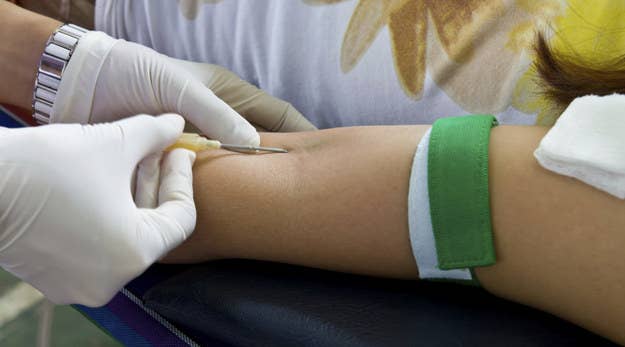
The Food and Drug Administration’s proposal to change its 30-year-old policy that bans men who have had sex with another man from donating blood for life has highlighted a problem not often discussed in connection with the so-called “gay blood ban”: the policy’s incoherent, arbitrary treatment of transgender people.
“Our policy is to designate by sex at birth,” FDA spokesperson Tara Goodin told BuzzFeed News. “That is all there is to it."
The policy, medical experts say, creates for transgender people what is, effectively, an inverse of the blood ban applied to other people. For example, a transgender woman who only has sex with straight men is banned from donating blood. A transgender man who is gay and has sex with men, on the other hand, is allowed to donate blood.
“The existing policy is flawed at its core,” Madeline Deutsch, a medical doctor and director of clinical service at the Center of Excellence for Transgender Health at UCSF, told BuzzFeed News, “and transgender people highlight this problem.”
The policy regarding trans people is “confusing,” added Kenneth Mayer, a professor of medicine at Harvard University and the medical research director at The Fenway Institute, a research and policy center that focuses on LGBT people and HIV.
“Somebody who is a biological man who transitioned to become a transgender woman could be quite high-risk or may be very low-risk depending on who their partners are," Mayer said. "In my mind, making a categorical statement without having any behavior data is problematic.”
This application of the rule to trans people has been the FDA's position for some time, but BuzzFeed pressed the question for weeks after the agency announced in December that it would propose reforming the policy in 2015, limiting the ban to men who have had sex with men in the previous year. The FDA, however, calcified around the rules.
“Recent scientific data continue to indicate that transgender females are at high HIV risk," Goodin, the FDA spokesperson told BuzzFeed News, adding, "The FDA currently recommends that male to female transgender individuals should be regarded as males for the purposes of determining donor eligibility.”
But when BuzzFeed repeatedly asked about blood donations from other demographics of transgender people — such as transgender men who were born female — Goodin said, “I ran this through several different people at the FDA, and the FDA cannot generally respond to hypothetical situations.”
Deutsch, the UCSF doctor, was astounded at that response.
“Someone at the FDA saying a transgender person is hypothetical is a real-life example of how transgender people are not calculated in when policies are made,” said Deutsch. She said that lack of awareness and accommodation in health policy causes a “cycle of bad health outcomes.”
Transgender people make up nearly 700,000 people in the United States, which is roughly the number of Native Hawaiian and Pacific Islanders, Deutsch pointed out. “If you called the FDA and said a policy has negative impact on Hawaiian Americans, they would not say that is a hypothetical. They would either already have them included in the policy or they would put their tail between their legs and think of some kind of response.”
The experts added that the incoherence of the FDA’s policy with regards to transgender people illustrated the larger problems with the policy — problems that led to criticism of the proposal to change the ban from a lifetime ban to a one-year ban.
“It is absurd to determine eligibility based on how someone identifies and who they are attracted to. It should have to do with behaviors that put someone in a high-risk category,” Deutsch said. Those risky behaviors include IV drug use, unprotected sex with multiple partners, and sex while intoxicated. She supports a policy that assesses behavior, not binary gender roles or sexual orientation, as the basis for denying blood donations.
The FDA's Goodin would only say that where the policy is unclear, medical professionals in the field have leeway to ban potential donors. “[T]he ultimate determination of donor suitability is made by the medical director of the blood or plasma establishment," she said. "Establishments may voluntarily elect more stringent donor deferral criteria than those required or recommended by the FDA.”
But that could mean banning all transgender people from donating blood — something that Mara Keisling, the executive director of the National Center for Transgender Equality, told BuzzFeed News is often the case.
“In practice, it has been a ban on transgender people donating blood,” Keisling said in December. “We have transgender people who have tried to donate and been told transgender people are excluded, while other people are told you qualify as a gay man, and it doesn’t matter if the person is a transgender man or a transgender woman. It’s just the usual ignorance we have to deal with.”
The FDA’s treatment of the issue is in marked contrast to the Obama administration in other areas, most notably in terms of education and workplace discrimination.
Goodin did note that "[t]he FDA encourages all stakeholders, including those concerned about transgender issues, to take the opportunity to provide comments on the draft guidance."
The American Civil Liberties Union told BuzzFeed it intends to do just that.
"By its very nature, the current one-size-fits-all policy needlessly bars many very low-risk individuals — gay, bisexual and transgender — from being eligible to donate. Decisions on donor criteria must be based on science, and not on outdated stereotypes," said Ian Thompson, ACLU legislative representative.
The FDA has not yet set a date for proposing the new policy.
